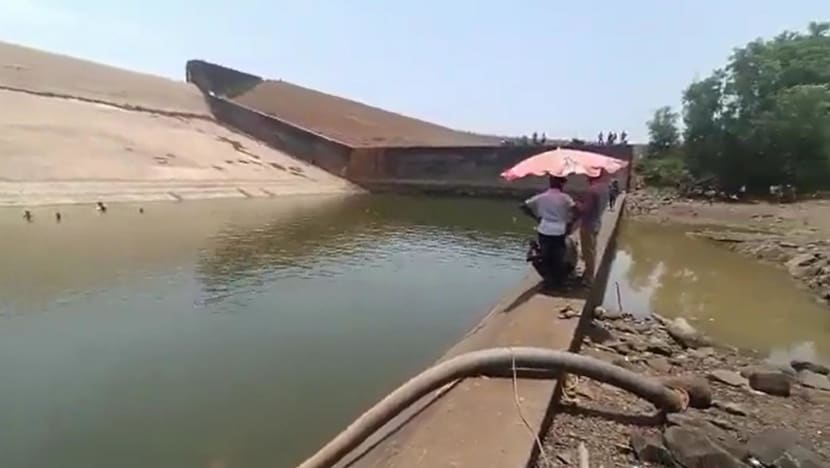Commentary: Management 101 - don’t drain a reservoir to find your phone
The actions of one Indian official are a guide to what not to do when in a panic, says Anjli Raval for the Financial Times.

In videos that went viral on social media, Rajesh Vishwas is seen sitting under a red umbrella as diesel pumps run to drain water from the reservoir. (Image: Twitter/@ramanmann1974)
LONDON: How bad was your week? Well, fear not. Rajesh Vishwas is here to make you feel better.
The Indian government official was recently suspended after he ordered a reservoir to be drained so he could retrieve his mobile phone, which had fallen in when he tried to take a selfie while picnicking with friends.
Taking the old “but I need it for work” excuse to whole new levels, Vishwas, a food inspector, claimed his Samsung mobile held sensitive government data and therefore had to be found.
It took three days to pump 2 million litres of water out of the reservoir, enough to irrigate over 400 hectares of farmland in a country suffering from water scarcity. The phone was found but was, unsurprisingly, waterlogged and unusable.
Leaving aside the question of whether he tried the old “put it in a bag of rice” trick, the entire scenario is undoubtedly farcical. But there are also easy lessons from this victory in the abuse of power stakes that should apply to anyone in a position of authority facing a management decision.
BASIC REQUIREMENTS OF A LEADER
Lapses in judgment and a sheer lack of integrity fly in the face of the most basic expectations of what it means to be a leader.
There is a fundamental requirement to not be selfish, to think of others and to try your very best to do no harm - for example, by depriving a scorching country of a much-needed resource or by throwing a party in the heart of government when your nation is under pandemic lockdown rules. Employees, clients and the public tend to demand it.
Yet the normalisation of dishonest or unethical behaviour is corrosive. Two-thirds of countries rank below 50 in Transparency International’s corruption index, where zero is highly corrupt and 100 is very clean.
Bad behaviour may start slowly but over time it erodes trust inside organisations, spurs others to follow the same path and can have serious consequences - legal or otherwise.
New examples arise daily in both business and politics - from the misuse of public funds and acceptance of bribes to other sorts of workplace misconduct - and usually, these are never just one-off examples but a cascade.
LEADERS SHOULD NOT MAKE DECISIONS IN A PANIC
As Vishwas’s case shows, when an incident occurs that is shameful or bruising to the ego, leaders often make decisions in a panic. In such circumstances, there is a tendency to be impulsive and irrational - drain that reservoir, burgle that political headquarters.
Such responses can even involve elaborate cover-ups that do more damage than the original offence. Who can forget the Watergate scandal that brought down former United States president Richard Nixon?
Or Bill Clinton’s denial of his affair with White House intern Monica Lewinsky? When evidence then emerged, he faced impeachment proceedings for perjury and obstruction of justice related to his attempts to hide the affair.

ADVISERS HAVE A ROLE TO PLAY TOO
Advisers and aides must not act as enablers for bad behaviour. Good managers seek to make informed decisions, evaluate risks, and find effective solutions to problems with the help of team members.
Sometimes it is important to say things that you know may not go down well with your boss but which are necessary for their success and survival. As a leader, being open to dissent is essential. A string of “yes men” who follow every mad whim is only detrimental.
And finally, even if an admission of failure is not forthcoming, some semblance of contrition is vital.
After Vishwas’s story went viral, the official sought to justify his actions and alleged he had gained relevant approvals from the water resources department. (They in turn claim he drained more water than was permitted, although the fact that they agreed to any amount is itself outrageous.)
After his suspension and being asked to pay a fine, he still called the reaction “overblown”.
Sometimes it is best to know when to quit - or to shell out for a new phone.















